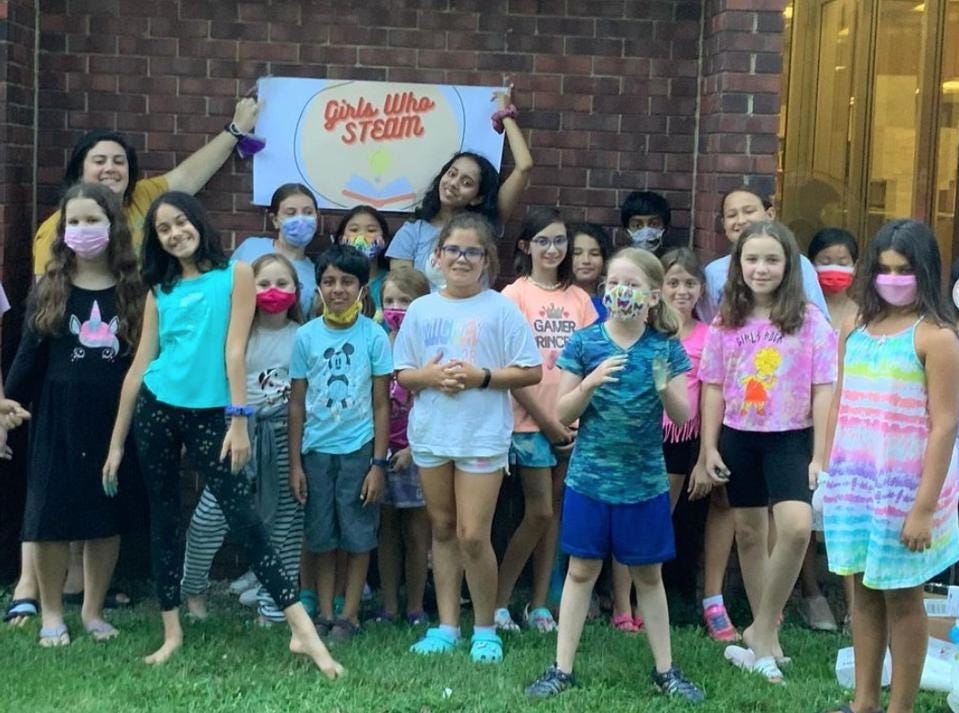blog
My First Time Attending A Conference Across The Country By Myself
2022 Call For Kindness Fellow Sriya Tallapragada (Girls Who STEAM) of New Jersey participated in Riley’s Way’s first-ever Call For Kindness Retreat on February 10-12, 2023, in Washington, DC. Read below her Retreat observations and watch her speech, where she beautifully describes facing her fears after being alone in a room with a group of active kindergartners!

About a month ago, I had the honor of attending the Riley’s Way Call For Kindness Retreat. Hosted in Washington, DC, it was my first time attending a conference across the country by myself. Additionally, before attending the conference, I had been selected by the Storytelling District to be a Story Workshop speaker. I had prepared my story for the event but was certainly anxious about what it would mean to share it with an audience.
However, upon arriving at the Retreat, any anxiety I had quickly went away. At the Retreat, I was privileged to meet a community of supporting, caring, and kind individuals who I immediately clicked with. As soon as I arrived, I was able to speak with other Fellows, and I was amazed by the stories they shared. I was so inspired by the organizations they were able to start, the initiatives that we formed, and the movements that were created by such young people. On the second day, I woke up to an inspiring keynote address by Social Architect Eva Maria Lewis, and before I knew it, it was time for the storytelling workshop. I thought I would be nervous about delivering my story, but an odd sense of reassurance flooded me as I walked on the stage. While my story was in no way perfect, the Riley’s Way Community was so supportive. Because of them, I didn’t stop to dwell on every stutter or pause but instead felt proud of myself for taking that risk and getting on stage. As a serial perfectionist and someone who tends to obsess over every mistake, this was instrumental in developing confidence in me as a public speaker.
The remaining parts of the Retreat went by in a blur. Spending time with the rest of the attendees, I grew very close to those around me. Despite being from different parts of the country, we all bonded over shared experiences in volunteerism and advocacy. I left the Retreat with a new community of changemakers whom I’m sure will continue to inspire and support me in their kind leadership.
Below is the speech Sriya delivered at the Retreat.
There is nothing more terrifying than being alone with a group of kindergarteners. But somehow, this is what I found myself in last summer.
One, I find myself standing in front of an old science classroom door, with a cart of science supplies trailing behind me, mentally preparing myself for what was to come. I had no idea what to expect, especially considering this was the first time I would be running a camp without any adults present. Still, I talked myself into opening the door and entering the classroom. What I saw immediately made me want to turn back.
Inside were about 15 kindergarteners. Half of them were running around, chasing each other in what looked like a game of tag. The other half were crying, some even throwing temper tantrums, their faces bright red as they shrieked.
It certainly didn’t help that the classroom was hot. Really hot. Turns out science classrooms over the summer in New Jersey don’t have AC. Just perfect.
I immediately ran in, throwing my hands in the air, separating the students fighting, stopping someone from running around, and giving tissue papers to those crying. I wish my attempts were helpful, but I think I only made them more freaked out. Also, I was only one person, and there were only so many kindergartners I could help at once. It was like the second I consoled one from crying, another would be a mini emergency I had to attend to. Only 20 minutes into the camp, I was quickly exhausted.
That’s when I decided to pull out the science experiments I had brought. As a child with a lot of energy, science experiments were what distracted me and calmed me down. I was hoping it could have the same effect on the kids.
The experiment I had brought for that day was slime. It’s relatively simple: you take the glue, mix in saline solution and baking powder, and then add whatever food coloring you want. Surely there’s no way to mess this up, right?
Wrong!
Within seconds, the table was covered in glue, baking powder spilled everywhere, and kids chased each other to get food coloring on each other’s clothes. I watched in horror as the entire room was transformed into a saline solution slip and slide, knowing that I would have to clean it up.
There was one girl who was actually doing the work, though. She carefully mixed the saline solution into the glue, but she spilled too much in when she added the baking powder. The slime grew stiff and separated easily.
“Here! Fix this!”
She shoved the slime in my face, and I desperately tried to make it better, adding in glue and materials that I thought would reduce the density.
To my dismay, it wasn’t working.
She did not take it well when I tried to explain this to her. “You can’t even fix my slime? What kind of teacher are you!” She fumed. She stomped away, her pigtails swaying behind, leaving me with a messy room, screaming kids, and a slime that wouldn’t yield.
After the first day was finally over, I packed my bags and began the silent drive home. My mom kept asking me questions, wondering how the first day went, but I just gave boring answers as I tried to figure out what had happened myself.
By the time I had arrived home, I had made two conclusions: 1) the girl was right. I had no place in that classroom trying to teach those kindergarten students. I wasn’t even qualified myself. I’m 16, for god’s sake, and I wouldn’t know how to teach them science! 2) I refuse to spend another day in that camp. Forget about two more weeks.
When I shared these discoveries with my mom, she sighed, but instead of letting me quit, she encouraged me to stick with the camp.
“You never know,” she said. “You might find them growing on you.”
It wasn’t the answer I was looking to hear, but I decided to trust her. The next day, I returned with my kit, bracing myself for the worst. I did this for the next two weeks.
Turns out my mom was right, as moms so often annoyingly are. I soon decided to change my approach. These kids weren’t listening to me when I tried to be their teacher, so maybe I should try becoming their friend.
For the next day, I stayed and solved fights, listened to their stories about summer vacations, and essentially learned more about them as people. I was shocked by what I discovered, but to my relief, it seemed to be working. They soon were listening to what I was saying.
It also was a lot easier to run through experiments with them once we were friends. They dictated the curriculum just as much as I did. Turns out they really liked making slime, so with patience, I taught them how to do it without making a huge mess. They listened.
By the end of camp, I was actually sad to see them go. The yelling girl with the pigtails left by giving me a hug and gifting me with slime she made, this time perfect.
“For you,” she said. “For being a great teacher—and my best friend.”
Working with kids for that long is not easy. But if you stick with it long enough, you might find yourself learning more from them than they’ll learn from you.

